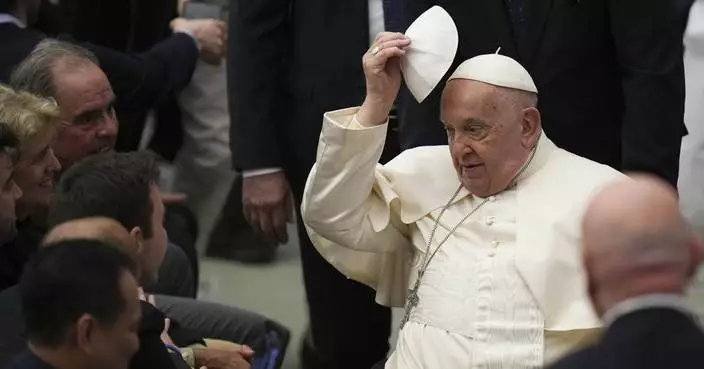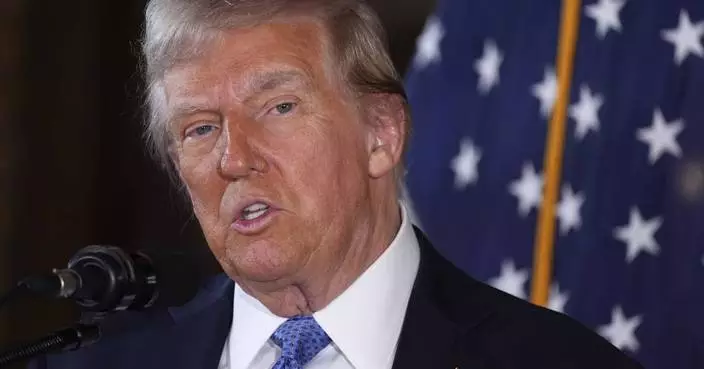HONG KONG (AP) — Hong Kong's government on Wednesday said the U.S. House of Representatives twisted facts in an attack on the city as it passed a bill that could close its representative offices in America, while Beijing threatened to take countermeasures if they are shuttered.
The Hong Kong Economic and Trade Office Certification Act was part of a series of China-related legislative proposals being scrutinized by the House this week. Many of the proposals scheduled for a vote appear to have both Republican and Democratic support, reflecting a strong consensus that congressional actions are needed to counter Beijing.
If approved, the measures would still need to clear the Senate and be signed by the U.S. president before officially becoming law. They are expected to increase diplomatic tensions between the world's two largest economies, which see each other as rivals in many areas and have conflicting views over various issues, including on Hong Kong.
On Wednesday, Hong Kong's Secretary for Commerce and Economic Development Algernon Yau strongly condemned the bill's passage, saying it was political slander against the laws that safeguard national security and smeared the city's human rights situation “without any reason at all.”
He said the American Chamber of Commerce in Hong Kong had surveyed its members and found that about 70% of respondents felt no negative impact from the Beijing-imposed security law. He said there are about 1,200 American companies in the city.
“The passing of the bill ... actually is not creating any benefit to anybody at all,” he said.
The Hong Kong government said in a statement that the attack on the semi-autonomous Chinese city was “politically driven,” violated international law and “grossly interferes” in Hong Kong's affairs.
The office of China's Foreign Ministry in Hong Kong also issued a strongly worded statement, saying if the U.S. pushed the bill forward and shut the offices, China would take resolute countermeasures.
In Beijing, Chinese Foreign Ministry spokesperson Mao Ning said the act politicizes normal trade cooperation and is “very egregious.” Mao said Hong Kong is the second-largest source of trade surplus for the U.S., warning the move would ultimately jeopardize America's own interests.
“China urges the U.S. to stop pushing forward the bill, so as not to cause more harm to the stability and development of China-U.S. relations,” she said.
The bill passed the U.S. House with bipartisan support, 413-3, on Tuesday. It proposes to require the White House to remove the extension of certain privileges to the three Hong Kong Economic and Trade Offices in the U.S. — in Washington, New York and San Francisco — if the city no longer enjoys a high degree of autonomy from China, and for other purposes.
Under the proposals, the U.S. secretary of state would need to determine whether the offices merit the privileges. If the answer is no, the offices would have to terminate their operations within 180 days after that determination is delivered to Congress.
Republican Representative Chris Smith, chair of the Congressional-Executive Commission on China, said in a statement that the act is a “necessary next step in tangibly demonstrating our solidarity with the persecuted citizens of Hong Kong."
Since Beijing imposed the 2020 security law to quell months of huge anti-government protests in 2019, authorities have arrested many leading pro-democracy activists, including Apple Daily founder Jimmy Lai and former student leader Joshua Wong. Critics say the freedoms promised to remain intact for 50 years when the former British colony returned to China's rule in 1997 were drastically shrinking.
In response to the law, the U.S. previously deprived the territory of its preferential trading status and put sanctions on high-ranking Hong Kong officials. But Beijing and Hong Kong insist the law is necessary to bring back stability to the financial hub.
Anna Kwok, executive director of the Hong Kong Democracy Council, a Washington-based group advocating for the city's pro-democracy movement, said in a statement the bill was a much-needed response to hold the Hong Kong government accountable “for their blatant human rights abuses." Kwok was among a group of overseas-based activists targeted by Hong Kong police bounties.
Hong Kong has 14 overseas trade offices, aiming to strengthen economic, trade and cultural ties between the foreign territories and the city.
But they came under scrutiny when an office manager in its London branch along with two other men were charged in Britain for allegedly assisting the Hong Kong intelligence service in May.
Chinese authorities in both the U.K. and Hong Kong at that time criticized the charges brought by London authorities, saying they were the latest in a series of “groundless and slanderous” accusations that the British government has leveled against China.
Chen contributed from Washington, D.C.

FILE - China and Hong Kong flags are hung as the city marks China's national day in Hong Kong, Sunday, Oct. 1, 2023. (AP Photo/Chan Long Hei, File)











